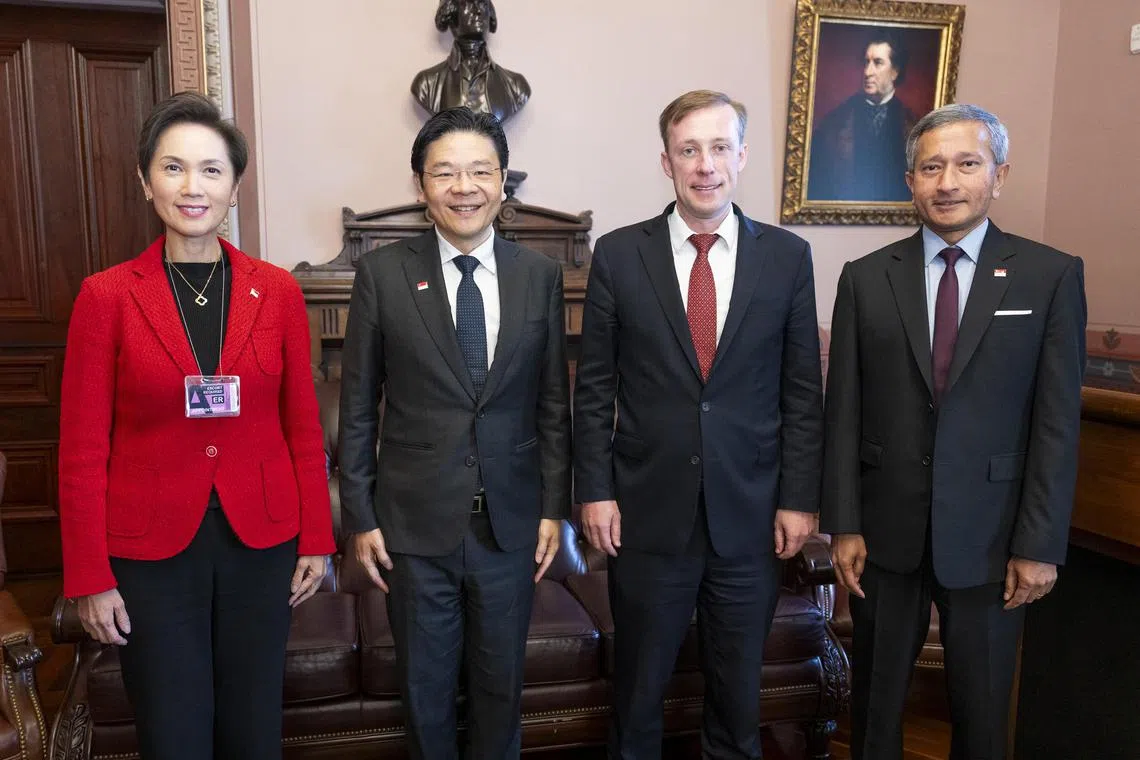Singapore, US can work in sync to ensure game-changing tech serves the world: DPM Wong
Sign up now: Get ST's newsletters delivered to your inbox

Singapore and the US play complementary roles in innovation and are like-minded partners when it comes to critical and emerging technologies, said DPM Lawrence Wong.
PHOTO: COURTESY OF THE WHITE HOUSE
WASHINGTON – Singapore and the United States can together ensure that advanced technology stays benign and solves pressing global problems, Deputy Prime Minister and Finance Minister Lawrence Wong said on Thursday.
He was delivering the opening remarks at the inaugural US-Singapore dialogue on critical and emerging technologies during his ongoing working visit to the US.
Critical and emerging technologies – such as artificial intelligence (AI), quantum computing, biotechnology and cyber security – are those with significant potential to impact national security and economic prosperity.
The meeting was led on the US side by National Security Adviser Jake Sullivan and Acting Special Envoy for Critical and Emerging Technology Seth Center, on behalf of Secretary of State Antony Blinken, who is on an emergency trip to Israel.
The Singapore delegation was helmed by Foreign Minister Vivian Balakrishnan and Minister for Communications and Information Josephine Teo, who is also Minister-in-Charge of Smart Nation and Cybersecurity.
DPM Wong noted that the new wave of game-changing technologies
“Dealing with these issues will require us to have the right standards and governance frameworks in place. These are complex issues that no one country can deal with alone,” he said, welcoming the US-Singapore dialogue to address these big questions.
Although vastly disparate in size, Singapore and the US play complementary roles in innovation and are like-minded partners when it comes to critical and emerging technologies, said Mr Wong.
“The US is a global innovation centre, home to many companies and universities which operate at the frontiers of science and technology. Singapore is not quite at that leading edge, but we also play a useful role in the global innovation value chain.
“We are able to move quickly because of our small size. We are nimble and agile, and can adopt and scale technology solutions across our economy and society very quickly.”
Mr Wong added that Singapore can also help build an early consensus on common tech standards for the use of critical and emerging technologies.
That makes the two nations see eye to eye on the future of tech, he said. “We are united in our belief that only by fostering open, accessible and secure technological ecosystems can we truly leverage the power of technology to solve the pressing global problems of our time.”
A joint statement at the end of the dialogue said Singapore and the US have committed to launching new bilateral initiatives across domains such as AI, digital economy, biotechnology and quantum information science and technology.
This includes setting up a bilateral AI governance working group to advance principles for safe and responsible innovation and a potential multilateral code of conduct.
The next session of the dialogue will be held in Singapore in 2024.
In his meeting with Mr Sullivan and other US officials during the day, Mr Wong discussed areas for bilateral cooperation and geopolitical issues.

(From left) Communications and Information Minister Josephine Teo, DPM Lawrence Wong, US National Security Adviser Jake Sullivan and Foreign Minister Vivian Balakrishnan at the inaugural US-Singapore dialogue on critical and emerging technologies.
PHOTO: COURTESY OF THE WHITE HOUSE
“Singapore and the US share common strategic interests across a wide range of areas. Our bilateral cooperation also serves as a pathfinder for the US’ broader engagements with the region, especially in new and emerging areas,” Mr Wong said in a social media post.
“I discussed our practical and substantive bilateral cooperation with National Security Adviser Jake Sullivan today. There is much scope for us to work together in areas like clean energy, space, as well as digital and tech solutions. We also exchanged views on the global outlook and geopolitical developments,” he said.
In a statement, the White House said Mr Sullivan and Mr Wong reviewed opportunities to expand the relationship, such as through additional cooperation with Asean and other Indo-Pacific partners.
Mr Wong also met Deputy Secretary of the Treasury Wally Adeyemo. “We exchanged views on the strengthening of international financial institutions, and areas for collaboration between our two countries,” Mr Wong said in a social media post.
On Wednesday, he engaged with top companies at the US Chamber of Commerce. On the concluding day of his visit on Friday, Mr Wong was set to participate in a discussion on the future of bilateral ties at a prominent US think-tank, the Centre for Strategic and International Studies (CSIS).
The event is part of the CSIS Asean Leadership Forum, where senior officials from South-east Asian countries address pressing issues before a Washington-based policy audience.


